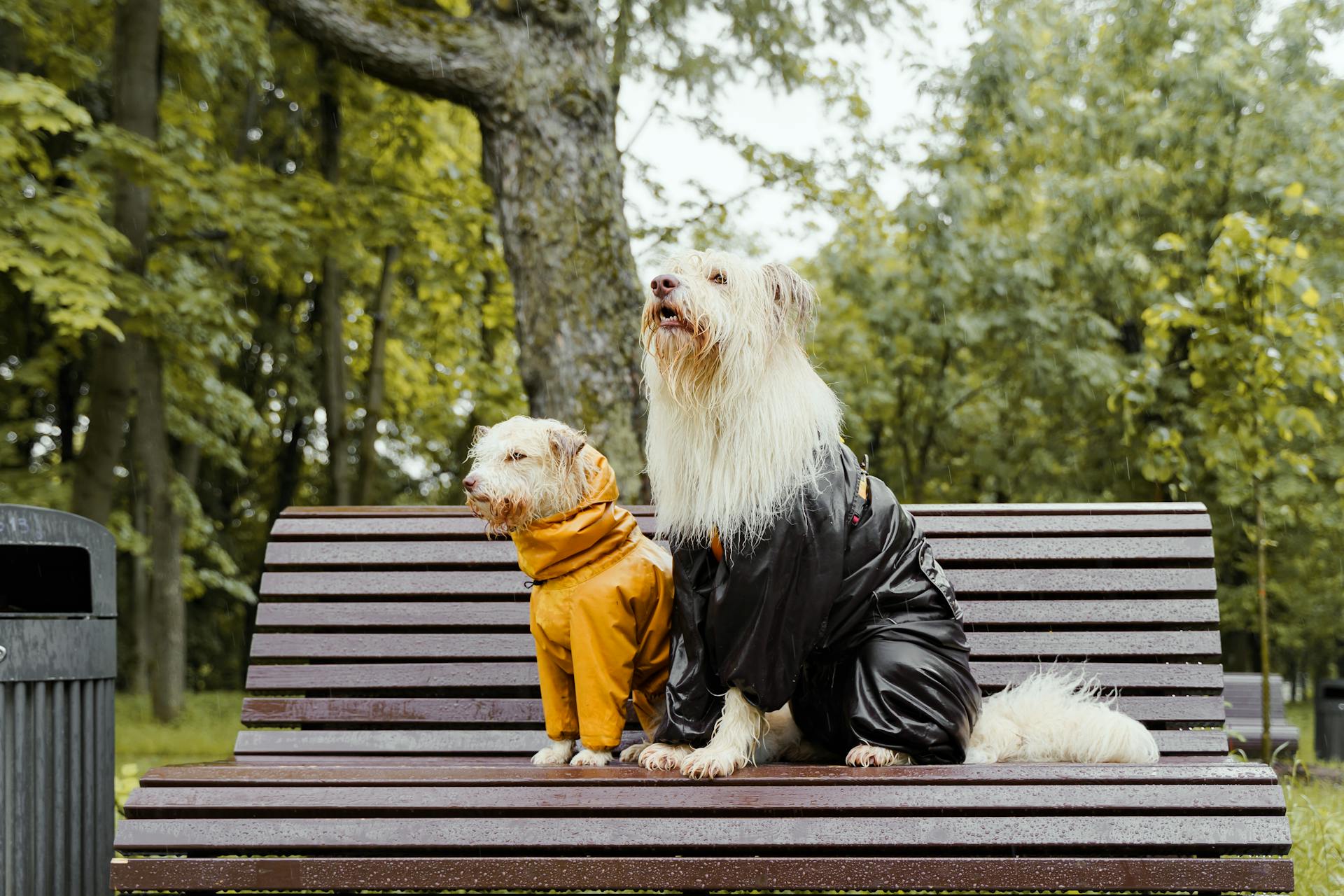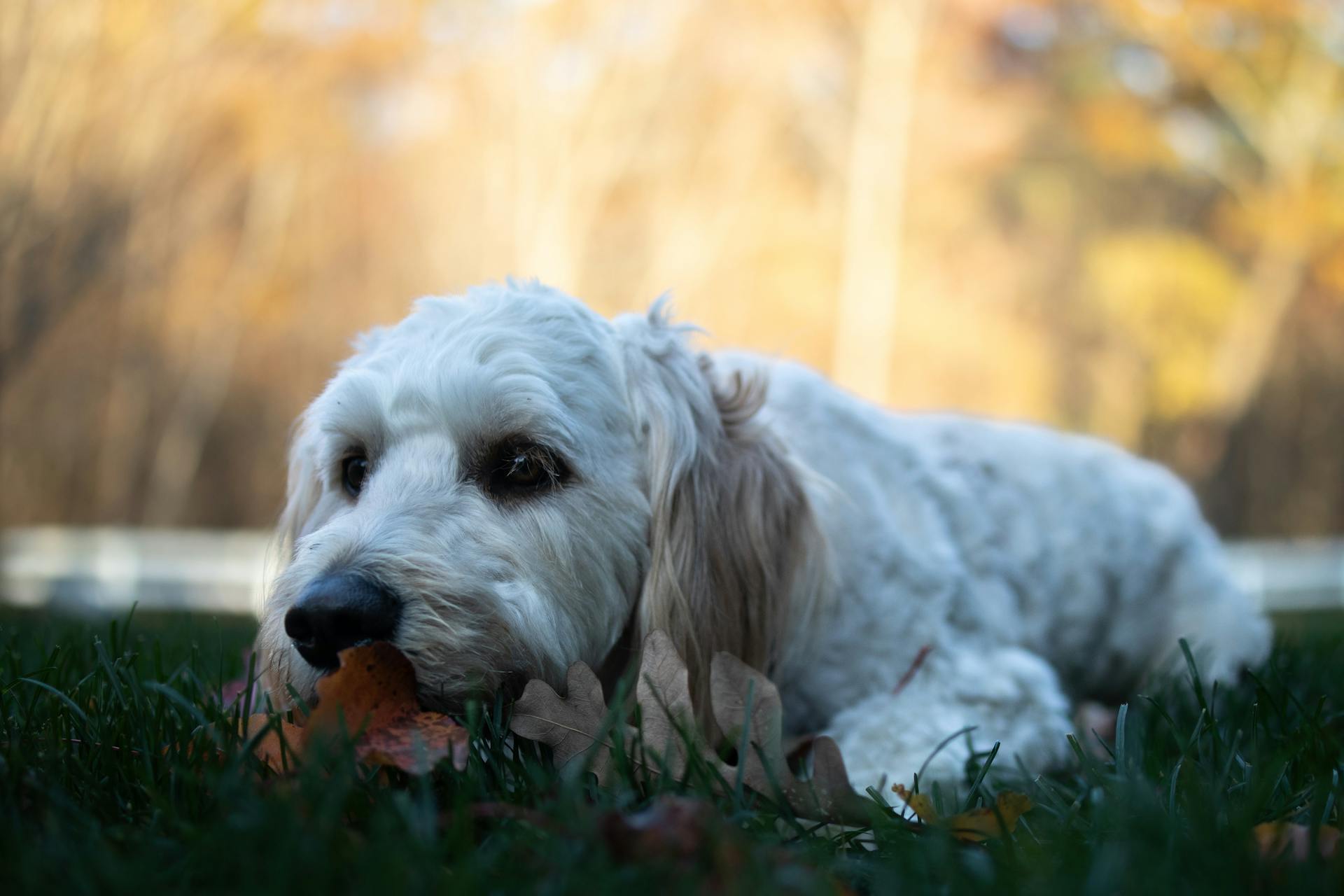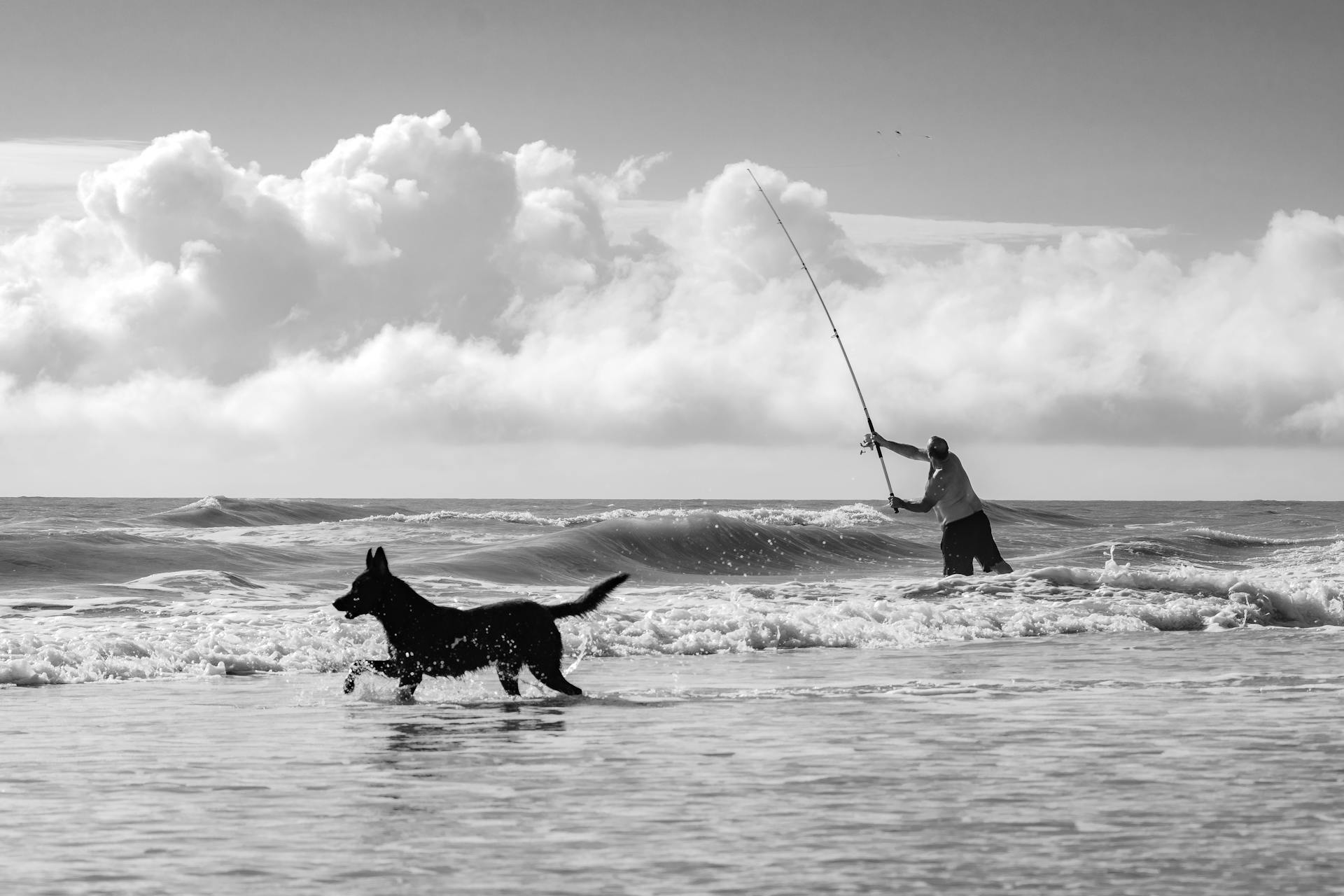
As a dog owner, it's natural to wonder if sharing your meals with your furry friend is a good idea. The truth is, human food can be both safe and unsafe for dogs, depending on the type and amount consumed.
Some human foods are toxic to dogs, such as chocolate, which can cause vomiting, diarrhea, and even heart problems. On the other hand, certain foods like carrots and green beans are safe and healthy for dogs to eat.
It's essential to know the difference between safe and unsafe human foods for your dog. For example, grapes and raisins are highly toxic to dogs and can cause kidney failure.
Dogs have different nutritional needs than humans, so it's crucial to stick to their regular dog food for optimal health.
Foods to Avoid
Chocolate is toxic for dogs, and it's not just chocolate that's a problem - chocolate, coffee, and caffeine are all on the no-go list. These substances can cause vomiting, an accelerated heartbeat, seizures, and even death.
Grapes and raisins are another big no-no, as they contain toxic compounds that can lead to rapid kidney failure and death. Even small amounts can make your dog sick.
Here are some common human foods that are toxic to dogs:
- Chocolate
- Coffee
- Caffeine
- Grapes
- Raisins
- Avocado
- Onions
- Garlic
- Xylitol (found in candy, gum, and baked goods)
- Yeast dough
- Lemons and limes (due to psoralen in the skin)
- Cherries (due to cyanide in the pits)
Salt should also be limited in your dog's diet, as excessive intake can lead to salt poisoning or water deprivation, causing vomiting, diarrhea, and seizures.
Grapes and Raisins
Grapes and raisins are toxic to dogs and should be avoided at all costs. Even small amounts can cause kidney failure and death.
Grapes and raisins contain toxic compounds that are harmful to dogs. These compounds have the potential to lead to rapid kidney failure and death.
If you suspect your dog has ingested grapes or raisins, it's essential to seek veterinary attention immediately. The sooner your dog receives treatment, the better their chances of survival.
Here are some key facts to keep in mind:
- Grapes and raisins are toxic to dogs and can cause kidney failure and death.
- Even small amounts can be harmful.
- Seek veterinary attention immediately if you suspect your dog has ingested grapes or raisins.
Salt
Salt is a major no-no for your furry friend's diet. Excessive salt intake can lead to serious health issues, including salt poisoning and water deprivation.
Dogs can't handle high amounts of salt, which can cause vomiting and diarrhea. In severe cases, it can even be fatal.
So, what salty foods should you avoid giving your dog? Chips and pretzels are definite no-gos. Always keep an eye on your dog's water intake to prevent water deprivation.
Broaden your view: Is Coconut Water Bad for Dogs
Macadamia Nuts
Macadamia nuts are a no-go for our furry friends. Dogs should never eat macadamia nuts, even in small amounts, as they contain an unknown toxin that can lead to vomiting, muscle weakness, tremors, hyperthermia, and depression.
Macadamia nuts have a high fat content, which can elevate a dog's triglyceride levels and potentially cause pancreatitis. This is a serious condition that requires veterinary attention.
Macadamia nuts are a common snack for humans, but it's essential to keep them out of reach of our dogs. If you suspect your dog has eaten macadamia nuts, monitor their behavior closely and seek veterinary advice if necessary.
You might like: Pine Nuts Bad
Fat and Calorie Overload
Fat and calorie overload is a serious concern when it comes to feeding your dog human foods. Even small amounts can lead to weight gain and poor health if fed regularly.
Almonds, for example, are high in fat and calories and may cause weight gain and pancreatitis in dogs. They're also difficult for dogs to digest, which can lead to vomiting and diarrhea.
Peanut butter, a popular treat for dogs, is also high in fat and calories, making it a potential contributor to weight gain. It's best to limit your dog's peanut butter intake and choose plain, unsalted varieties.
Peanuts, like almonds, are high in fat and may contribute to weight gain and pancreatitis if your dog eats too many of them. It's best to only give your dog a few plain peanuts at a time.
Bread, on the other hand, is generally safe for dogs to eat in moderation, but it's still a source of extra calories that can lead to weight gain if eaten in excess.
See what others are reading: What Can Dogs with Pancreatitis Eat
Cashews, like almonds and peanuts, are high in fat and calories, making them a potential contributor to weight gain and pancreatitis. Limit your dog's intake to one or two cashews a day or less.
The bottom line is that even small amounts of human foods can have a big impact on your dog's health. Be mindful of the fat and calorie content of the foods you're giving your dog, and choose healthier alternatives when possible.
You might like: Crude Fat
Lemons and Limes
Lemons and limes are toxic to your dog due to the psoralen in their skins, which can cause vomiting and diarrhea.
If your dog ingests the skin of a lemon or lime, it's essential to monitor their symptoms closely.
Dogs can experience gastrointestinal symptoms like vomiting and diarrhea after consuming the skin of lemons or limes.
Consuming large amounts of psoralen can lead to more severe symptoms, including muscle tremors and difficulty walking.
Liver failure and even death can result if your dog ingests a very large amount of psoralen.
A fresh viewpoint: Why Do Dogs Throw up Food
Nutmeg
Nutmeg is a common spice used in many recipes, but it's also a potential allergen.
Some people may experience allergic reactions to nutmeg, which can range from mild symptoms like itching and hives to more severe reactions like anaphylaxis.
Nutmeg can also be toxic in large quantities, causing symptoms like nausea, vomiting, and seizures.
The toxic compound in nutmeg is called myristicin, which can also cause hallucinations and other altered states of consciousness if consumed in excess.
Cinnamon
Cinnamon is non-toxic to dogs, but it's still essential to limit their intake.
If your dog consumes cinnamon in large quantities, it may irritate their mouth and digestive system.
Inhaling cinnamon powder can cause coughing, choking, and breathing difficulties.
Even foods with cinnamon as an ingredient, like baked goods, can lead to adverse effects if your dog eats too much.
Pork: Can
Cooked pork without added spices, seasonings or sauces is safe for dogs to eat.
Raw or undercooked pork can lead to a bacterial infection, making your dog sick.
Processed forms of pork, such as ham and bacon, are not good for dogs because they're often extremely high in salt.
It's best to stick with plain, cooked pork for your furry friend.
Tomatoes
Tomatoes can be a problem for dogs, especially if they're green. Green tomatoes contain small amounts of tomatine, a toxic glycoalkaloid.
Dogs that eat too many green tomatoes may experience nausea, an abnormal heart rate, muscle weakness, and difficulty breathing.
While green tomatoes aren't toxic to humans, it's still a good idea to keep them out of reach of your furry friends.
Worth a look: Dogs Eating Tomatoes
Turkey
Turkey is a processed meat that's often linked to increased risk of colorectal cancer. It's made from a mixture of meat, seasonings, and preservatives, which can be detrimental to our health.
Processed meats like turkey contain sodium nitrite, a preservative that's been linked to cancer. I've read that consuming high amounts of sodium nitrite can increase the risk of colorectal cancer by up to 18%.
Turkey is also high in saturated fat, which can raise cholesterol levels and increase the risk of heart disease. A single serving of turkey sausage can contain up to 30 grams of fat.
A fresh viewpoint: Is High Protein Dog Food Good for Dogs
The World Health Organization has classified processed meat as a carcinogen, and turkey is no exception. Consuming 50 grams of processed meat per day can increase the risk of colorectal cancer by 18%.
Turkey is often served at social gatherings and holidays, but it's worth considering alternative protein sources to reduce our intake of processed meat.
Readers also liked: Is Lamb Meat Good for Dogs
Frequently Asked Questions
Is it okay to feed your dog human food every day?
No, feeding your dog human food every day is not recommended, as it can lead to weight gain and poor health due to excessive fat and calorie intake. Learn more about safe and healthy human food options for your dog.
What are the 10 most toxic foods for dogs?
Dogs should avoid the following toxic foods: onions, garlic, caffeine, alcohol, macadamia nuts, dairy products, bones, and excessive salt, which can cause a range of health issues from mild to life-threatening
What can Chihuahuas eat human food?
Chihuahuas can safely eat human foods like carrots, apples, plain popcorn, and peanut butter, but always consult with a vet before making any changes to their diet
What is the healthiest food to feed your dog?
For a balanced and nutritious diet, consider feeding your dog plain, unseasoned foods like cooked white rice, plain yogurt, and cooked turkey, which are easily digestible and rich in essential nutrients. However, consult with your veterinarian to determine the best diet for your dog's specific needs and health status.
What are the top 10 toxic foods for dogs?
Dogs should avoid the following toxic foods: onions, garlic, caffeine, alcohol, macadamia nuts, dairy products, bones, and salt, which can cause a range of health issues from mild stomach upset to life-threatening illnesses
Sources
- https://www.aspca.org/pet-care/animal-poison-control/people-foods-avoid-feeding-your-pets
- https://www.healthline.com/nutrition/human-foods-for-dogs
- https://www.petmd.com/news/view/why-dogs-should-not-eat-people-food-34758
- https://tikipets.com/is-it-safe-to-feed-dogs-human-food/
- https://www.chelsystoys.com/blogs/news/safe-human-food-for-dogs-a-dogs-eating-guide
Featured Images: pexels.com


